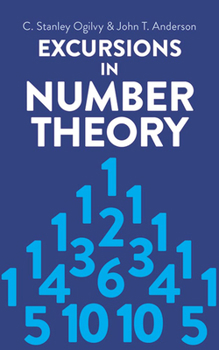Excursions in Number Theory
Select Format
Select Condition 
Book Overview
"A splendidly written, well selected and presented collection ... I recommend the book unreservedly to all readers, in or out of professional mathematics, who like to 'follow the gleam' of numbers." -- Martin Gardner.
The theory of numbers is an ancient and fascinating branch of mathematics that plays an important role in modern computer theory. It is also a popular topic among amateur mathematicians (who have made many contributions to the field)...
Format:Paperback
Language:English
ISBN:0486257789
ISBN13:9780486257785
Release Date:November 1988
Publisher:Dover Publications
Length:192 Pages
Weight:0.95 lbs.
Dimensions:0.5" x 5.5" x 8.0"
Customer Reviews
4 ratings
An Enjoyable Romp Through Number Theory, Skipping from Topic to Topic
Published by Thriftbooks.com User , 18 years ago
Excursions in Number Theory (Oxford, publ. 1966; Dover reprint 1988) is a brief pleasure trip across the realm of number theory. C. Stanley Ogilvy's and John T. Anderson's enjoyable text only requires that readers have familiarity with algebra and have a penchant for puzzles. For those interested in more mathematics twenty pages of explanatory notes are found in the appendix. Using carefully selected examples, the authors present key topics with surprisingly clarity. Although congruences (arithmetic, not geometric), Diophantine equations, and continued fractions may be unfamiliar, the reader rather quickly appreciates the critical roles played by these concepts and tools. For example, congruences prove to be exceedingly helpful in solving a wide range a numeric problems and also reappear in later discussions on irrationals, iterations, and Diophantine equations. The study of prime numbers is fundamental to number theory, but as yet we have no known formula to produce all primes. Even more disturbing, we have no procedures that are even guaranteed to produce only primes (i.e., not yield an unpredictable mix of primes and composite numbers). There is something fundamental about primes that we seem not to understand. The short chapter, Prime Numbers as Leftover Scrap, offers a fascinating perspective that I have not encountered elsewhere. Other chapters are more playful, offering curios, puzzles, and oddities. Some examples appear to be little more than amusing numeric coincidences while other oddities prove to have theoretical significance. I am not an avid fan of mathematical puzzles, but I thoroughly enjoyed these diversionary chapters. As a follow-up to Ogilvy and Anderson, I am now reading: Number Theory and Its History by Oystein Ore (1948), available as a Dover reprint (1988), is now rather old, even pre-dating computer use in number theory research. The difficulty level is moderate. The historical background is interesting. (3 stars) Elementary Theory of Numbers (1962) by William J. LeVeque offers detailed proofs underlying number theory and should appeal to readers that enjoy studying mathematics. Topics include congruences, powers of an integer modulo m, continued fractions, Gaussian integers, and Diophantine equations. The Dover reprint suffers from a small font size. (3.5 stars) Yet another Dover reprint, Number Theory (1971) by George Andrews also targets more serious readers. Andrews uses an interesting combinatorial approach to number theory. Good font size and open page layouts. (4 stars)
Fantastic Journey
Published by Thriftbooks.com User , 22 years ago
This is a reprint of one of the books that most inspiredmy interest in mathematics as a boy. I highly recommendit to any high school student interested in mathematicsor perhaps as a gift that might stimulate interest.It is very short and very readable. I also recommendthe book "Excursions in Geometry" by Ogilvy.
A Wonderful Trip
Published by Thriftbooks.com User , 23 years ago
Unlike other Dover books, this text does not require an extensive background in math and fluency in the language of proofs. It is, as the title suggests, a delightful excursion through number theory that will ignite your interest in the subject and move you to further study.I found the author's annotations helpful and I did not mind the occasional use of British vernacular. At many points in the text, Ogilvy & Anderson prompt the reader to pursue a question on their own, rather than walk through a full proof or explanation. This may seem abrupt, but it keeps the text focused and leaves the reader wanting to know more about number theory.I hope Dover continues to reach out to a general audience with books like this. It condenses a difficult subject into everyday language without condescending to the reader.
An amusing and short book covering the "fun" of numbers.
Published by Thriftbooks.com User , 27 years ago
Written for anyone with an interest in numbers, this booktalks about some of the "neat" things about numbers withoutrequiring more than high school mathematical knowledge. Topics covered include prime number, geometric numbers, repeated fractions, and other chestnuts in mathematical recreations. This book is written at precisely the right level to interest a wide range of readers. For college mathematics students, a higher level book, such as "Fundamentals of Number Theory" by Leveque would be recommended as a primer to the theory of numbers.





